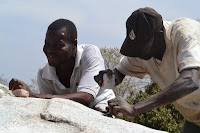 |
| Roya,Katrine, Shazia and Festus at the National Cultural Centre |
We recently had the pleasure of meeting with Katrine who is
an officer at the Sandema Branch of the National Cultural Centre. We went to
speak with her in order to get information and general guidance on whether
there are any existing cultural groups, how we go about setting up cultural
groups for Persons with Disabilities (PWD’s) for the Feok Festival etc.
The meeting was very interesting and we appreciated how frank
she was about the current state of cultural activities in the Builsa District.
She spoke about how the District Assembly (the council) doesn’t regard culture
with as much importance as they should do. They see it as only being limited to
drumming and dancing when in fact it encompasses a range of different elements
such as the communities beliefs, traditions etc. This misconception also
filters down to the rest of the community.
 |
| Trainee weaving the material at the Centre |
It’s going to be a long process but the work we are doing
will eventually lead to PWD’s becoming fully integrated into their communities.
The cultural activities program will prove to the community and the PWD’s
themselves that they can and should be allowed to celebrate their traditions
and history. As we spoke to various
Disabled Peoples Organisation’s (DPO’s) we heard from individuals who felt
scared to perform in front of the community because they have been stigmatised
and discriminated against for so long, they fear further ridicule. That is why
it is important to work on projects like these because it rebuilds their
confidence in their own self-efficacy and will allow them to engage in cultural
activities, profitable businesses and sports to the same level as able-bodied
people. Although we may provide them with the tools they need to support
themselves, part of the struggle is them overcoming their lack of faith in
their own abilities which has been instilled in them from a young age. Despite
this, after the recent meeting with the Sandema DPO and through our discussions
about cultural activities, they have since organised a group rehearsal. This is
the first organised rehearsal that they have had for many years so it is a
positive step in the right direction!
- Shazia
- Shazia





